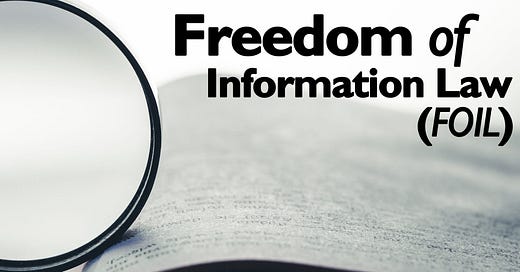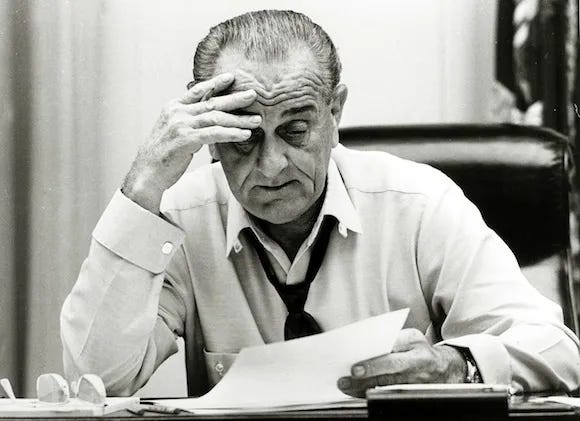Sunday, September 1, is the 50th anniversary of New York's Freedom of Information Law (FOIL.) Let's celebrate the role that open and transparent government plays in safeguarding democracy.
Obtaining government records, with certain exceptions, is your right as a citizen.
Editor’s note: The Chronicle thanks Paul Wolf, President of the New York Coalition For Open Government (NYCOG), for supplying much of the historical information on which this article is based. The Chronicle, represented by its editor, is affiliated with NYCOG.
These days, we take it for granted that citizens have a right to know what their government is doing, even if the fight for that right seems never ending. But it was not always so, at least not in our laws. The U.S. Freedom of Information Act (FOIA) did not come into existence until 1966, when President Lyndon Johnson signed it with great reluctance on July 4 of that year, in time for the nation’s birthday.
And LBJ only did so after a 12 year long campaign by California Congressman John Moss and other legislators to make it happen.
As Bill Moyers, LBJ’s press secretary, later recalled:
“LBJ had to be dragged, kicking and screaming, to the signing ceremony. He hated the very idea of open government, hated the thought of journalists rummaging in government closets, hated them challenging the official view of reality.”
But since the FOIA only applied to federal records—and had plenty of exceptions and exemptions, including for Congress itself—it was left to the individual states to enact their own laws covering state and municipal records. Sadly, New York was one of the last states to do so. A bill to create the law was first introduced in 1970 by Assembly member John Terry of Syracuse, and later taken up by Assembly member Donald Taylor. Only one out of about 60 state agencies expressed any interest in expanding access to their records, although a new law was strongly supported by the New York Civil Liberties Union.
Finally, in the spring of 1974, under the governorship of Malcolm Wilson, the legislature got serious about freedom of information. On September 1 of that year, what is called the Freedom of Information Law (FOIL)—actually a segment of the Public Officers Law—went into effect.
That was the good news. The bad news was that the law enacted in 1974 was actually quite begrudging about granting citizens the rights to examine government records. The ruling presumption was that the citizen had to prove that they were entitled to the records, rather than the state having to prove they should not have them. That changed in 1977, when the state legislature passed significant amendments to the law that put the burden of proof on the government. You can view the current version of the FOIL here.
As anyone who has tried to use the FOIL to get records from the village of Croton-on-Hudson might attest, public officials often cite one or more of the exemptions in the law to withhold documents. The Chronicle has had a mixed experience using the FOIL to get at village records. One of our earliest scoops, concerning plans to develop the so-called “Finkelstein property,” came as a result of a FOIL request. But we have also been denied records we think villagers are entitled to, for example when we asked for the competing proposal to develop the property at Parking Lot A.
When a request for records is denied, and then an appeal of that decision is denied—as happened with our FOIL request concerning Lot A—citizens have a last recourse with the New York court system. Indeed, over the past 50 years since the FOIL was enacted, the courts have repeatedly interpreted and reinterpreted the law. Fortunately, the overall tendency of these court decisions has been towards greater transparency in government, rather than the other way around.
Ten years ago, for the 40th anniversary of the FOIL, New York’s Committee on Open Government, which advises the state on government transparency issues (including the important Open Meetings Law), compiled a history of the legislation which included references to most of the court decisions which today guide how the FOIL is interpreted and applied. Here are some of the most interesting and important ones (the decisions listed at this link also include many involving the Open Meetings Law:)
1976:
Zuckerman v. NYS Board of Parole, 385 NYS2d 811, 53 AD2d 405 (1976) – State agency regulations cannot be more restrictive than FOIL.
1978:
Warder v. Board of Regents, 410 NYS2d 742 (1978) – Personal notes taken during meeting are “records” subject to rights of access.
Zaleski v. Hicksville Union Free School District, Board of Education of Hicksville Union Free School, Sup. Ct., Nassau Cty., NYLJ, Dec. 27, 1978 – Tape recording of open meeting is accessible “record”; fee is cost of cassette.
1979:
Doolan v. BOCES, 422 NYS2d 927, 48 NY2d 341 (1979) – FOIL is a governmental obligation, not gift or waste; rejection of executive privilege.
1984:
Johnson Newspapers Corp. v. Stainkamp, 94 AD2d 825, 61 NY2d 958 (1984) – Identities of persons arrested available unless dismissal.
1987:
Runyon v. Board of Education, West Hempstead Union Free School District, Supreme Court, Nassau County, January 29, 1987 – Information derived from discussion in executive session not privileged.
1988:
Kerr v. Koch, Sup. Ct., New York Cty., NYLJ, Feb. 1, 1988 – NYC Mayor’s appointment calendar available.
1992:
Planned Parenthood of Westchester, Inc. v. Town Board of Town of Greenburgh, 587 NYS2d 461 (1992) – Mug shots available unless dismissal of changes.
1994:
Buffalo Broadcasting Co., Inc. v. New York State Department of Correctional Services, 552 NYS2d 712, 155 AD2d 106 (1990) – Not-for-profit corp. under govt. control subject to FOIL.
1996:
High court construes FOIL broadly and provides guidance concerning trade secret exemption. Encore College Bookstores, Inc. v. Auxiliary Services Corporation of the State University of New York at Farmingdale, 87NYS2d 410 (1996).
1999:
Mantica v. NYS Dept. of Health, 699 NYS2d 1, 94 NY2d 58 (1999) – Court of Appeals found that patients may obtain own medical records under FOIL.
2009:
Bly v. City of Yonkers, Supreme Court, Westchester County, March 17, 2009 – Agency could not meet burden of proof relative blanket denial re unsolved 1952 murder.
2012:
Hernandez v Office of the Mayor of the City of New York, 100 AD3d 555, 955 NYS2d 7 (1st Dept 2012) – E-mail between Mayor and nominee for Chancellor not inter-agency or intra-agency because nominee not yet employed in that or other position.
2013:
Legal Aid Society v. NYS Department of Corrections, 105 AD3d 1120, 962 NYS2d 773 (3rd Dept 2013) – award of attorney’s fees proper when applicant subjected to unreasonable delays and denials of access.
Loevy & Loevy v. NYPD, Supreme Court, New York County, October 10, 2013 – blanket denial regarding “cold case” inconsistent with FOIL.
Regenhard v. City of New York, 102 AD3d 612, 959 NYS2d (1st Dept, 2013) – Names and home addresses of families or representatives of 9/11 victims deniable.
Paul Wolf of NYCOG tells us that there have not been any major FOIL cases over the past decade. That might be because over the past decades, many or most of the major issues concerning interpretation of the law have been litigated. But in 2027 we will celebrate the 50th anniversary of the Open Meetings Law, which has an equally interesting and contentious legal history as the FOIL. The Chronicle might not wait that long to do a report on that law and how it applies here in Croton, so stay tuned.
An important take-home message is that the New York FOIL is not just for reporters. Any citizen anywhere can file a request and expect a timely response consistent with the law. Without abusing our public servants here in Croton, perhaps the best way to celebrate the FOIL’s 50th anniversary would be to file a request when you want to know something you can’t find out otherwise, and then insist that the law be followed. (The link to do so is here.)
The law demands it, and democracy does too.
***************************************************************************************************
We go to a lot of effort to keep you informed about what is going on in Croton. If you have not already done so, please consider taking out a paid subscription.
To share this post, or to share The Croton Chronicle, please click on these links.
To give someone a gift subscription, please click on this link.
Comments policy: Please be polite and respectful.








Excellent Article!